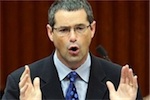 Mid-morning today I received a phone call from ABC journalist David Mark, who was after a backgrounder on the Tor network the lunchtime current affairs program The World Today. His call brought me the news of what appears to be a significant win in the battle against online child exploitation.
Mid-morning today I received a phone call from ABC journalist David Mark, who was after a backgrounder on the Tor network the lunchtime current affairs program The World Today. His call brought me the news of what appears to be a significant win in the battle against online child exploitation.
Fourteen arrests were made as part of Operation Round Table, which according to the (American) ABC, was an investigation led by the US Immigration and Customs Enforcement (ICE), US Postal Inspection Service and federal authorities in Louisiana.
The roughly 250 victims were spread across 39 states and five other countries — Australia, Belgium, Britain, Canada and New Zealand. Most were boys between 13 and 15. Two victims were 3 or younger, authorities said.
The pornographic images were shared on an underground website on the Tor network, an online anonymity network that masks the location of servers and conceals an Internet user’s location. The subscription-based website operated from about June 2012 until June 2013, had more than 27,000 members and shared more than 2,000 webcam-captured videos, mostly of young boys, authorities said.
There’s further material in the (Australian) ABC story, Australian victims among 251 identified in ‘members only’ child porn website.
The World Today ran Mark’s four-minute story, including comments from US secretary of homeland security Jeh Johnson, and federal attorney-general for Louisiana Kenneth Polite, as well as my own small contribution.
Podcast: Play in new window | Download (Duration: 4:32 — 2.1MB)
The audio is of course ©2014 Australian Broadcasting Corporation, served here directly from their website —– where you can also read a full transcript.
If you’d like some more information on how Tor works, and how users’ mistakes can lead to their anonymity being rather less effective than they’d hoped, my Crikey Clarifier: how the FBI hacked users of Tor, the ‘secret internet’ from August 2013 could be a useful starting-point.



